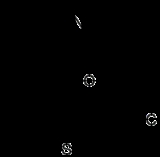
Zotepine
Encyclopedia
Zotepine is an atypical antipsychotic
indicated for acute and chronic schizophrenia
. It has been used in Germany
since 1990 and Japan
since 1982.
activity at dopamine
and serotonin receptors. Zotepine has a high affinity for the D1 and D2 receptors. It also affects the 5-HT2A
, 5-HT2C
, 5-HT6
, and 5-HT7 receptor
s. In addition, it acts as a norepinephrine reuptake inhibitor
, likely contributing to its efficacy against the negative symptoms of schizophrenia.
s. Somnolence
is the second most common side effect. Constipation
, asthenia, dry mouth, and akathisia
are also reported. As with all antipsychotics, there is a risk of tardive dyskinesia
, a potentially incurable neurologic disorder, with prolonged use of zotepine.
The likelihood of side effects are as follows:
Atypical antipsychotic
The atypical antipsychotics are a group of antipsychotic tranquilizing drugs used to treat psychiatric conditions. Some atypical antipsychotics are FDA approved for use in the treatment of schizophrenia...
indicated for acute and chronic schizophrenia
Schizophrenia
Schizophrenia is a mental disorder characterized by a disintegration of thought processes and of emotional responsiveness. It most commonly manifests itself as auditory hallucinations, paranoid or bizarre delusions, or disorganized speech and thinking, and it is accompanied by significant social...
. It has been used in Germany
Germany
Germany , officially the Federal Republic of Germany , is a federal parliamentary republic in Europe. The country consists of 16 states while the capital and largest city is Berlin. Germany covers an area of 357,021 km2 and has a largely temperate seasonal climate...
since 1990 and Japan
Japan
Japan is an island nation in East Asia. Located in the Pacific Ocean, it lies to the east of the Sea of Japan, China, North Korea, South Korea and Russia, stretching from the Sea of Okhotsk in the north to the East China Sea and Taiwan in the south...
since 1982.
Pharmacology
The antipsychotic effect of zotepine is thought to be mediated through antagonistReceptor antagonist
A receptor antagonist is a type of receptor ligand or drug that does not provoke a biological response itself upon binding to a receptor, but blocks or dampens agonist-mediated responses...
activity at dopamine
Dopamine receptor
Dopamine receptors are a class of metabotropic G protein-coupled receptors that are prominent in the vertebrate central nervous system . The neurotransmitter dopamine is the primary endogenous ligand for dopamine receptors....
and serotonin receptors. Zotepine has a high affinity for the D1 and D2 receptors. It also affects the 5-HT2A
5-HT2A receptor
The mammalian 5-HT2A receptor is a subtype of the 5-HT2 receptor that belongs to the serotonin receptor family and is a G protein-coupled receptor . This is the main excitatory receptor subtype among the GPCRs for serotonin , although 5-HT2A may also have an inhibitory effect on certain areas such...
, 5-HT2C
5-HT2C receptor
The 5-HT2C receptor is a subtype of 5-HT receptor that binds the endogenous neurotransmitter serotonin . It is a G protein-coupled receptor that is coupled to Gq/G11 and mediates excitatory neurotransmission. HTR2C denotes the human gene encoding for the receptor, that in humans is located at the...
, 5-HT6
5-HT6 receptor
The 5-HT6 receptor is a subtype of 5-HT receptor that binds the endogenous neurotransmitter serotonin . It is a G protein-coupled receptor that is coupled to Gs/Go and mediates excitatory neurotransmission. HTR6 denotes the human gene encoding for the receptor.-Distribution:The 5-HT6 receptor is...
, and 5-HT7 receptor
5-HT7 receptor
The 5-HT7 receptor is a member of the GPCR superfamily of cell surface receptors and is activated by the neurotransmitter serotonin The 5-HT7 receptor is coupled to Gs and is expressed in a variety of human tissues, particularly in the brain, the gastrointestinal tract, and in various...
s. In addition, it acts as a norepinephrine reuptake inhibitor
Norepinephrine reuptake inhibitor
A norepinephrine reuptake inhibitor or adrenergic reuptake inhibitor , is a type of drug which acts as a reuptake inhibitor for the neurotransmitters norepinephrine and epinephrine by blocking the action of the norepinephrine transporter...
, likely contributing to its efficacy against the negative symptoms of schizophrenia.
Dosing
The most common dosage used is 150 mg daily. It is suggested that zotepine therapy starts at 75 mg to 150 mg divided into three daily doses. Some people may need to have their dosage increased to 300 mg.Side effects
The most common side effect of zotepine is weight gain. This weight gain side effect compares badly to the older typical antipsychoticTypical antipsychotic
Typical antipsychotics are a class of antipsychotic drugs first developed in the 1950s and used to treat psychosis...
s. Somnolence
Somnolence
Somnolence is a state of near-sleep, a strong desire for sleep, or sleeping for unusually long periods . It has two distinct meanings, referring both to the usual state preceding falling asleep, and the chronic condition referring to being in that state independent of a circadian rhythm...
is the second most common side effect. Constipation
Constipation
Constipation refers to bowel movements that are infrequent or hard to pass. Constipation is a common cause of painful defecation...
, asthenia, dry mouth, and akathisia
Akathisia
Akathisia, or acathisia, is a syndrome characterized by unpleasant sensations of inner restlessness that manifests itself with an inability to sit still or remain motionless...
are also reported. As with all antipsychotics, there is a risk of tardive dyskinesia
Tardive dyskinesia
Tardive dyskinesia is a difficult-to-treat form of dyskinesia that can be tardive...
, a potentially incurable neurologic disorder, with prolonged use of zotepine.
The likelihood of side effects are as follows:
- Weight gain: Medium to high
- Hyperprolactinemia: High
- Sexual problems: High
- Sedation: High
- Extrapyramindal: Low
- Hypotension: Medium
- Hyperglycemia: Low

